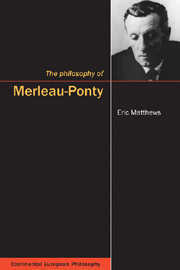6 - Politics in Theory and Practice
Summary
Even in his later years, when he had withdrawn from much of his former active involvement in political life, Merleau-Ponty continued to think about politics, in the sense both of general political theory and of the particular concrete problems of his day. Theory and practice were for him, as for many French intellectuals, ultimately inseparable: the position we take on particular practical problems (such as the relations of France and Europe as a whole with the USA) must be determined by a general theoretical view of the kind of society we want to create. In turn, his political theory can be understood only against the background of his general philosophical account of humanity and its nature, in particular his view of the inescapably social nature of human beings. But it is also true that the application of the general political theory to particular practical issues fills out our understanding of the theory itself, and of its foundation in general philosophy. Many of the concrete political issues that so preoccupied Merleau-Ponty and his contemporaries have by now become merely a part of history, but it is still worthwhile to examine his responses to them in order to increase our understanding of his social theory and general philosophy, and the ways in which they might be applied to the political dilemmas of our own time.
- Type
- Chapter
- Information
- The Philosophy of Merleau-Ponty , pp. 111 - 132Publisher: Acumen PublishingPrint publication year: 2002

